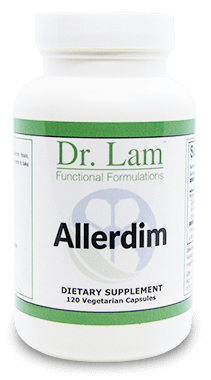Food allergies tend to present a range of symptoms, but weight gain is not one that quickly comes to mind. However, some people with allergies experience weight gain. Is there a connection between food allergies and weight gain? By understanding how they are connected, you'll learn how to manage your allergy symptoms and prevent weight gain.
A food allergy happens when your body triggers an abnormal immune response to eating particular foods. Allergens can go undigested or fail to break down when the food is cooked. Furthermore, these allergens can penetrate the gastrointestinal barrier and travel into the bloodstream and organs. There, they cause symptoms of an allergic reaction. These symptoms include:

There is no direct connection between food allergies and weight gain. Weight gain is not a direct symptom of food allergies.
However, food allergies and food sensitivities, particularly ones that are unrecognized, can play a role in a cascade of symptoms that leads to weight gain. If you have noticed weight gain when dealing with symptoms of food allergies, research has shown that the symptoms of food allergies could play a role in weight gain.
Inflammation is a common side effect of contact with food allergens. It may be the link between food allergies and weight gain. In people with chronic inflammation stemming from health conditions, such as Adrenal Fatigue Syndrome (AFS) or insulin resistance, weight gain is also a symptom.
The peptide hormone insulin is critical in regulating food metabolism in the body. Insulin resistance can be characterized as a condition in which the cells in your fat, liver, and muscles fail to respond well to insulin and are unable to use blood glucose for energy.
Inflammation not only activates but also increases the activity of various proteins that block insulin-signaling pathways. This action makes the body less responsive to insulin. As such, your pancreas responds by making more glucose, which worsens the condition by causing your glucose level to spike.
If you have trouble with insulin resistance, your body cannot properly metabolize the foods you eat. When this happens, you can develop an increased risk of weight gain. The extra pounds tend to show up especially around the area of the lower abdomen. A test of your blood sugar levels can indicate if you are experiencing insulin resistance.
Adrenal Fatigue Syndrome is the result of chronic stress, and it causes the NeuroEndoMetabolic (NEM) stress response to overwork. This causes cortisol levels to climb. One of the triggers of AFS is diet, and if it includes allergens, like gluten, a disrupted gut balance may also be a problem.
This disruption stresses your body and increases the risk of inflammation. For people with AFS who have weak adrenal function, allergens may worsen inflammation as well. As you experience more inflammation, it is more likely that you will gain weight.
The levels of a crucial inflammatory marker - C-reactive protein (CRP) - increase as your weight increases. Additionally, metabolic and hormonal changes tend to occur when inflammation increases and affects how insulin works in the body. The hormone leptin plays an essential role in speeding up or slowing down metabolism. When its function is compromised, leptin resistance occurs. As a result, metabolism slows down and weight gain occurs.
Ultimately, higher levels of glucose in the blood, greater fat build-up, and persistent inflammation leads to a cycle of weight gain. Healing your adrenals and minimizing inflammation can help to address this weight gain.
 A complex interaction between your immune system, hormones, environment, genes, and diet can impact your weight. Sometimes, food sensitivities may have a larger impact on weight than actual allergies. Food sensitivities can go unnoticed because the symptoms tend to be mild, slow to appear, and not severe.
A complex interaction between your immune system, hormones, environment, genes, and diet can impact your weight. Sometimes, food sensitivities may have a larger impact on weight than actual allergies. Food sensitivities can go unnoticed because the symptoms tend to be mild, slow to appear, and not severe.
Food sensitivity occurs either when your body is unable to digest certain foods properly or the food causes a reaction in your body. It’s linked to an increased level of certain IgG antibodies and not IgE antibodies. Common food sensitivities include lactose, casein, and gluten.
Some symptoms of food sensitivity may be acute (immediate), after ingestion of the trigger food, or delayed for up to 72 hours. Typically, they do not require urgent or emergency medical care. Common symptoms of food sensitivity include brain fog, fatigue, nausea, diarrhea, and bloating.
Food sensitivities can trigger a hormonal, neurotransmitter, or immune reaction, which can contribute to weight gain. The immune response sets in motion pro-inflammatory proteins (secreted by specific cells of the immune system) to neutralize the trigger food. However, in doing so, insulin receptors are blocked and glucose is stopped from entering the cells for energy utilization. Alternately, glucose is changed into fat and then stored in the fat cells.
Furthermore, another reaction could happen where the “feel good” neurotransmitter serotonin is used by the immune system and not as a neurotransmitter. When this happens, serotonin levels decline and the neurotransmitter cannot properly regulate appetite and cravings for carbohydrates.
This results in more cravings for carbohydrate-containing foods that commonly contain triggers like gluten and dairy. This can cause you to gain more weight and consume more of the foods that you are sensitive to.
The best way to address food sensitivities is to identify them and address any microbiome imbalances.
While your food allergy and weight gain may not be directly linked, allergy medications could also be a problem. Over-the-counter medications like antihistamines are a common option to manage food allergy symptoms. This medication could be causing you to gain weight.
Histamine is a chemical in the body that can cause allergy symptoms, such as hives, swelling, sneezing, and a runny nose. The hypothalamus, which is the appetite control center of the brain, contains histamine receptors. Antihistamine medication stimulates the hypothalamus. Used to manage allergy symptoms, antihistamines, like Diphenhydramine (e.g. Benadryl), Cetirizine (Zyrtec), Fexofenadine (Allegra), block histamine receptors. When this happens, it may disrupt the normal signal to the brain that indicates “I’m full” when eating. Also, this blockage prevents the body from effectively burning calories and slows down metabolism.
Consequently, this change can cause an increase in appetite and overeating, and it can also result in a slower breakdown of fat. These factors can contribute to weight gain. However, some antihistamine medications like Allegra and Zyrtec may have a lower risk of weight gain than medications like Benadryl.
Weight gain may not be typical in all users, but it’s something to consider if you have food allergies and cannot understand why you are gaining weight.
 Diet has a key role in preventing and managing food allergies. This could be another way that food allergies and weight gain are connected. One of the focuses in addressing food allergies has been an individualized allergen-avoidance diet plan. This involves avoiding the trigger foods to prevent an immune response.
Diet has a key role in preventing and managing food allergies. This could be another way that food allergies and weight gain are connected. One of the focuses in addressing food allergies has been an individualized allergen-avoidance diet plan. This involves avoiding the trigger foods to prevent an immune response.
However, sometimes this means that a healthy and nutritionally balanced diet is not maintained. A lack of adequate nutrition can lead to weight gain in allergy sufferers. Furthermore, a poor diet can result in an inflamed gut and force the immune system to work overtime.
A gut that lacks beneficial bacteria and a gut wall that is inflamed can cause nutritional deficiencies. This negatively affects immune system response, and by extension, metabolism and weight control. Research has shown that deficiencies in iron, copper, selenium, folic acid, and certain vitamins (A, B6, C, D, and E) can change immune responses.
The lack of proper nutrients also leads to imbalanced gut flora - microorganisms that inhabit the intestines. This imbalance can contribute to obesity.
A food allergy or sensitivity can lead to inflammation. This causes your adrenal glands to secrete hormones, like insulin and cortisol, that can prevent you from dropping weight.
If you don't know whether you have a food sensitivity, you can start by keeping a food diary of what you eat and any reactions you experience. Your doctor may suggest an elimination diet, in which you avoid common foods that may trigger a sensitivity, like dairy products, wheat, eggs, tree nuts, soy products, and processed foods. After 6 or so weeks, these foods are then added back one at a time to see if they cause a reaction.
If you have a known allergy, you will need to pay attention to food labels to make sure that it doesn't contain hidden ingredients. However, try not to over-restrict your diet and miss out on vital nutrients that you need. Ensure that you have a nutrient-dense diet that meets your nutritional needs.
You may need to consult with an allergist and a registered dietitian. They can help make a proper assessment and establish an appropriate allergen-free diet plan for you. You’ll learn how to maintain a nutrient-rich balanced diet, while safely avoiding food allergens. You get an understanding of the changes that you’ll need to make in your diet to avoid responses that can contribute to gaining weight.
Healing the gut can help manage your immune response and the inflammation that contributes to food allergies and weight gain. Particular supplements can help heal the gut and balance the Inflammation circuit, which is comprised of the immune system, gastrointestinal tract, and microbiome.

There are several indirect connections between food allergies and weight gain. These include inflammation, and increased risk of insulin resistance, leptin resistance, and nutrient deficiencies. However, allergy symptoms can be controlled to help keep weight gain at bay.
If you suspect you have a food allergy or sensitivity, speak to your doctor. Identifying a food allergy or sensitivity is the best way to know if the cause of your weight gain is connected.
If you are concerned about food allergies and weight gain and would like to find natural ways to address the issue, the team at Dr. Lam Coaching can help. We offer a free** no-obligation phone consultation at +1 (626) 571-1234 where we will privately discuss your symptoms and various options. You can also send us a question through our Ask The Doctor system by clicking here.

Navigate your meals with confidence - choose Allerdim!
Food allergies and weight gain are not directly connected. However, there are several ways dealing with allergies could play a role in causing weight gain. Inflammation, gut imbalance, allergy medications, and food sensitivities can all contribute to weight gain.